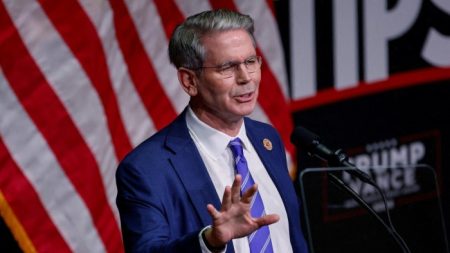Unlock the US Election Countdown newsletter for free
The stories that matter on money and politics in the race for the White House
The dollar and Treasury yields edged lower on Monday following Joe Biden’s decision to drop out of the US presidential race, as investors reassessed the “Trump trade” positions they have built in recent weeks.
As markets opened to news that Biden would not be seeking re-election, the dollar traded 0.1 per cent lower against a basket of rival currencies. US Treasuries gained, pulling the 10-year yield 0.01 percentage points lower to 4.23 per cent, reflecting what traders said were new unknowns in the run-up to the November presidential vote.
“In the next couple of weeks, I think there’s going to be more noise than signal for markets in what comes out on the political side,” said Ray Attrill, global co-head of foreign exchange strategy at National Australia Bank in Sydney. “Does that mean that economics will dominate? I don’t know. I think it all probably plays to a bit more indecision in the markets than has been the case in the last month or so.”
Growing confidence in a win for former president Donald Trump, which Rabobank’s Stefan Koopman said would likely lead to “deregulation, tax cuts and increased fiscal spending”, had in recent weeks boosted haven assets including gold and bitcoin as traders priced in a higher chance of crypto-friendly policies, rising geopolitical tensions and stronger US inflation.
Yet small moves early on Monday in the price of both assets — bitcoin advanced 0.4 per cent while gold rose 0.1 per cent to $2,402 per troy ounce — as well as in Treasury yields and the dollar, suggest that investors remained cautious about unwinding their recently built positions, said Koopman, whose “base case” remained a Trump win in November.
Prediction markets showed Trump’s victory odds declined slightly on Sunday as Biden officially endorsed vice-president Kamala Harris.
Long-dated Treasuries had been hit in recent weeks as investors priced in a growing chance of a second Trump presidency, betting his tax-cutting policies would be inflationary and bad for bonds. However, the impact had been muddied by increasing expectations of a Federal Reserve interest rate cut as US inflation fell.
In a note to clients, Stuart Kaiser, head of US equity trading strategy at Citigroup, said Biden’s decision to step aside would be a “headwind for Trump trades” and “add an uncertainty premium to the [Democratic National Convention] dates in August and shift odds back closer to our 50/50 base case” for the election outcome.
S&P 500 futures climbed 0.2 per cent ahead of the Wall Street open. European stocks rebounded from a string of losses last week, with the Stoxx Europe 600 0.6 per cent higher in early trade.
In Asia, the Nikkei 225 index fell 1.3 per cent. Traders said similar falls of 1.4 per cent in South Korea’s Kospi and 0.7 per cent in Australia’s S&P/ASX 200 were likely to be the effect of funds trimming positions built in recent weeks around expectations of a clear Trump victory. The yen traded in a tight range at about ¥157.5 to the dollar.
In Japan, defence industry stocks such as Mitsubishi Heavy, IHI and Japan Steel Works have recently soared to multiyear highs on a bet that a Trump victory and an era of US isolationism would force allies such as Tokyo to spend more on military equipment. Those same stocks dropped sharply on Monday, with shipbuilder IHI leading declines with a 3.7 per cent fall.
Trump’s frequent calls for tariffs to protect US manufacturers have prompted some investor concerns about companies likely to be affected but also provided a tailwind for Asian groups with strong manufacturing bases in the US.
“The bigger picture is that investors probably still see Trump with an advantage, so in market terms, this isn’t a huge change in the narrative. Asian markets are certainly going to be taking a lot of their direction on this from the ‘mother market’ in the US,” said Takeo Kamai, head of execution services at CLSA Securities in Tokyo.
Read the full article here












